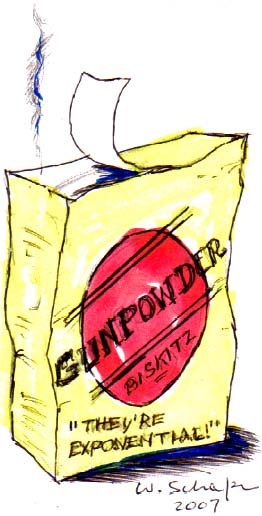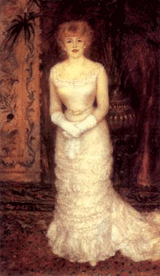| The Journal of Provincial Thought |
![]()
THIS SOMBER TALE details the manifold mysterious ways in which unbounded ambition may expand and proliferate like a virulent case of warts if left unchecked. It concerns an American of humble origins who became internationally known through the archaic medium of radio in the past 40 years, an unlikely Pilgrim’s Progress. It may bring to the attentive reader the comfort of a small moral.
Born in suburban Honkyville, a decaying farm town just outside the Twin Cities of Minnesota that was quickly absorbed by the rampantly expanding metropolis after WW II, young Snorri Krollie grew up in the 1950s as a true Son of Ike and card-carrying member of an obscure fundamentalist sect called the Portsmouth Ramblers, who had fled England to America hundreds of years before and obstinately remained a small, stagnant and inconsequential group on the fringes of upper-Midwestern whacky Protestantism. Snorri felt as viciously oppressed by his family’s quaint and inexplicable religiosity as by his unfortunate Icelandic-saga forename.
The young man grew up with an unblemished record of mediocrity and obscurity, with only one odd trait—an unquenchable compulsion to perform on AM radio, a medium by that time in the process of inanition and death. He observed his town quickly transformed from a Sherwood Anderson-Sinclair Lewis sinkhole of rural vices into a solidly middle-class and Republican new town of National Homes and Lustronized buildings, renamed by the Boosters as
Armed with this cloak of nominal invisibility, the new-born Agsnorri was emboldened to apply for a job at the local radio station, WHAL. To his surprise he was accepted on the basis of his suave bass voice, which made him sound at least 50 years old, and his slightly psychotic and intimidating stare. The words of his carnivalian oracle seemed vindicated. For several years, Agsnorri held down the WHAL night shift, from 11 pm to 7 am, with a program on which he played bizarre and obscure records excavated from the station’s ancient files, told long and rambling tales of his youth, committed serial non sequiturs and took jabbering phone calls from feckless sonambulists and sleepless sociopaths.
In short order, as the feeble 250-watt signal of WHAL penetrated the nearby Twin Cities and Agsnorri became an unaccountable fad, his all-nite chat-and-swat fest was labeled by the big city newspapers “a treat for those with nothing better to do” and “radiating all the charm of a paint-by-number kit designed by Norman Rockwell.” Agsnorri headed off for university and a job with a second-line Twin Cities station, KOOK in suburban Southdale, where big businessmen were building something called a “mall.” Over the next decade, Agsnorri worked tirelessly at two objectives: 1) to get his old radio scripts redacted to short story form and published in the ultra-prestigious New Yawper magazine, and 2) to draw a market share of urban radio larger than the daily Korn Krop and Hawgbelly Reports.
With the fatality of Greek tragedy, Agsnorri achieved his dream. He was transferred to the upscale FM band and forced to play selections of lite classical fare like Ambrosiana Von Zuppe’s Lite Infantry Galop, as well as his own endless anthology of surefire kornfed klassics from the station vaults. He was also somewhat curtailed in the stream-of-consciousness free association that was his trademark and received annoying phone calls from early morning commuters who said, “I don’t want to hear all that hayseed crap—just tell me the time and the weather report!” But his numbers went up and up, and one day the New Yawper sent him not another yellowed rejection slip but an actual hand-typed letter accepting one of his recycled radio tales! He was at last elevated to the Parnassus of American Letters and would be read and worshipped on the broad streets of
All this in a few years since university, a few miles out of grungy old Honkyville. Aye, there was the rub! He was still mired in oleaginous Midwesternness, immured by his own self-generated myth to be the Scandinavian farm boy from a made-up small town he called “Crimea River,” doomed to sell the imaginary Gunpowder Biskits to a vast, invisible audience of self-identified hicks, while pimping the efforts of “folk” musicians found inebriated on the streets of St. Paul—Paulie Lumpz and his electric button accordion, the Smoking Bottom Boys, Eulalia Griddle and her autoharp! He had christened his program The Boondocks Home Journal, but he decided he could as easily broadcast from midtown

Everyone told him
Puzzled and vexed, Agsnorri mounted a colossal snit and uprooted the show again, to go back to the untroubled
It is a monitory story of the climb to greatness of a small-town boy, and there is no descent to tragedy or repentance or even vague self-examination. The Boondocks Home Journal churns on and on, like a paddlewheeler on the mighty Mississippi, like a steam-driven threshing machine harvesting hectares of golden wheat, like the yellow caution light that burns so brightly at the end of the pier, like those fields that recede outward into darkness in the Republic for which they stand, one nation, invisible, with FM radio available to all. ###
![]()
| jptArchive Issue 6 |
![]()
| Copyright 2008- WJ Schafer & WC Smith - All Rights Reserved |

